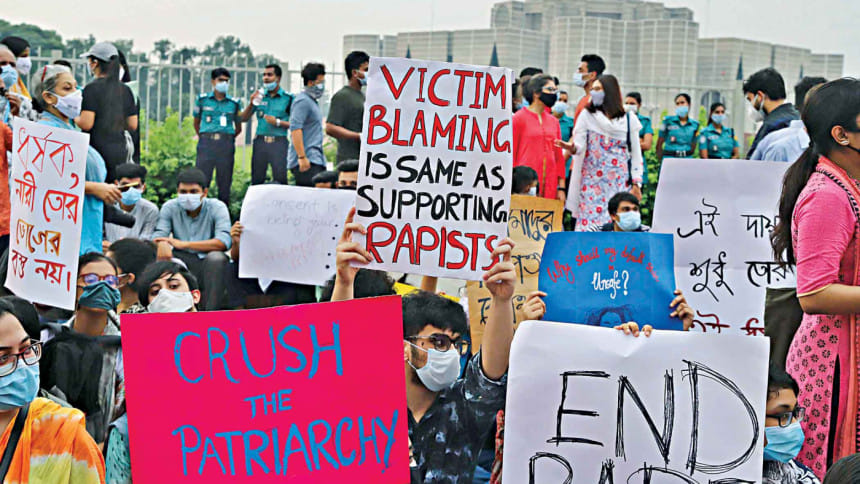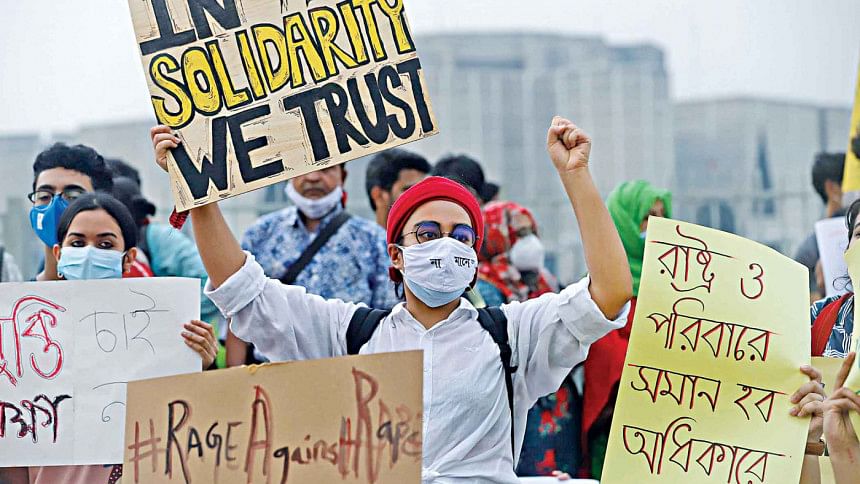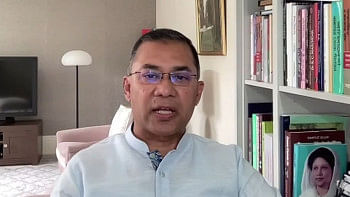How prepared are our women’s right movement activists?

Once at an event, advocate Sultana Kamal expressed bitterly how the women of Bangladesh have to start their race from the very beginning, whereas their male counterparts, participating in the same race, have a starting point somewhere comfortably set in the middle. The reason behind this is painfully obvious — no man faces one ounce of the multitude of the problems, both at home and at large that their female counterparts must.
Sultana Kamal did not just make a statement. It is indeed a fact that rings true around the world. And even more so for the women of this country. From the time of the British rule, the ground of competition has been unjustly biased against the women. The fight towards moving the female gender forward from this dark grasp has never been a struggle lasting a day or a handful of months. Nor has it been centred around a single individual. The struggle to move forward by any means has been, time and time again, marked by a succession of women leaders.
Those who have, over the ages, led women through the world of unfair competition are no longer with us in person. Yet, their ideals and their very soul are still part of what we are today. But there still remains crucial parts of their works that have yet to see the light of day.
The language movement, our fight for freedom, the numerous accounts of women fighting for their rights to education, arts, the struggle for gaining a foothold on the media — all these have at their heart, the story of unwritten, unknown names alongside the most prominent ones. At this moment in time, not a single of one these known and yet to be known figures can be denied their contributions.
The Question Ahead
Ayesha Khanam, Bula Ahmed, Rakhi Das Purkayastha — these three figures were lost within a short span during these dire pandemic times. Their departure has given rise to questions regarding the future of the women's right movements in Bangladesh. Are we at that point where the number of rightful women leaders to take the helm from these revolutionary movements are at a decline?
Tradition defying acts are the first steps of the women's rights movements. And these acts put the family, the workplace, the society and the state in the centre. It requires courage to defy all odds to stand against the injustice of society, to make a defining statement against the rigid boundaries, and to negotiate with government figures for a place of equality and dignity. This capacity is all in a day's work for the all-defying, true activist leader in every women's rights movement, but the question that bubbles up — will we find more such activists in our time? Already, the number of such figures are on the decline. And further down the line, we have to ask, who is handling the reigns of leadership?
The Unfinished Struggle
The struggles of the women in this region are far from over. Women may no longer be leading the homebound, under-siege existence of yesteryears, but the suppression and the spiteful acts have not relinquished one bit. Even now, basic rights are still denied to women. Will we have one more Sufia Kamal or another incarnation of Jahanara Imam to lead us once more from these atrocities? Is it really that faraway a dream to find one more soul similar to those who are intrinsically associated in various spheres and stages of women's rights?
The likes of Aroma Dutta, Khushi Kabir, advocate Sultana Kamal, Shireen Huq, Nasreen Pervin Huq, Maleka Begum, Shirin Akhter, advocate Salma Ali, Shaheen Anam, Rezwana Choudhury, Irene Khan, Sigma Huda, Ayesha Khanam, to name a few — are women like these, who have fought on the very streets or worked directly at policy levels, dwindling away?
Work at the policy level
There are many who are working at policy level from their positions, no matter what their professional and social standing, which relate to the women's rights movements processes. But the question that crops up is that do we have someone who is of true leadership fibre to take the next step forward for women's and human rights? Or is there a diminishing trend with women's rights movements? If the very streets and grassroots do not have their own home-grown part of the movement, is working on the policy level enough?
A Glance Backwards
There are numerous instances of women leaders in the country who have worked from a time when society deemed the fairer sex as a sub-human species. Their growth was in a space of miseducation and superstition. Those who had even the smallest modicum of hope, escaped without a backward glance from these murky depths of societal backwardness. And they did not just break free — they were the torch bearers leading the way out for the masses of women yearning to live a life of dignity and equality.
Detangling from this knot of obstacles has taken many decades. And to do it, women have gone through the proverbial "hell and back again" for their own freedom, the fight to establish their rights, and the biggest fight of all — to balance time for the family and bringing up their children.

The women of Bengal against the British reign
To find the root of the women's rights movement in this region, we have to start with the British rule and then move on to the birth of Bangladesh. The fight to attain anything worthy is always through a long and unchartered road, and it never comes within a year or a decade. The Muslim women of this region, for example, had to work hard to catch up by breaking the various barriers of conservatism.
The very same Bengal was the birth place of Pritilata Waddedar, Manorama Basu Masima, Hosne Ara Daulatunnessa, Dhaka University's first female student, Leela Nag. The ruling British Government of that time were actually put on a tight spot as women participated wholeheartedly in the Quit India Movement. The resounding "mota kapor, mota bhat" (plain clothes, plain food) movement that had begun at home with the women, was the core for the warriors of the Swadeshi Movement.
In Dhaka, women were the guardian of arms for the armed revolution. It was the women volunteers who had kept a hidden cache of arms at places like Bakshi Bazar, Chadni Ghat, Lakshmi Bazar, Azimpur. The Satyghraha Movement (Non-cooperation movement) taken against the Salt Law all saw active participants in Dhaka, with women led by Leela Nag.
Taking the streets for the mother tongue
For the love of the motherland and the mother tongue, women became actively involved with the Language Movement. So powerful was the motivation, that the ripple of movement was not encased solely within the capital Dhaka.
Women from all regions broke through the barricades imposed by society with clenched fists. Injured students were nursed by them, some were even imprisoned. This step forward, too, was a move against the flow of society back then. We remember with reverence Usha Bepari, Charubala Ganguly, Dr Halima Khatun, Nadera Begum, Pratibha Mutsuddi, Mariam Begum, Rawshan Ara Bachchu, Rani Bhattachariya, Razia Khan, Sofia Khan, and Sufia Ahmed, among many.
On The Right for Land Ownership
The womenfolk have little to no right over land, as valuable an asset as it may be, it in this country. Yet, from Ila Mitra to Jayeda Khatun, the struggle has always been for equal rights over land ownership as men.
Poor, rural women were shoulder to shoulder with educated women who were part of movements like Tevaga or Tonka. Communist Leader Ila Mitra was fortunate enough to have alongside her the likes of Kasmati Begum, Jayeda Khatun Joymoni, Dipishwari, Rashimoni Hajon, Sarla, Malati, Bulu Rani. However, even after the separation of India and Pakistan, the women of East Pakistan did not see much change in their status. The Language Movement leading to the birth of an independent Bangladesh was what took centre stage for all. Women's rights and demands were not yet set in an institutionalised form. Rather, it took an unfortunate turn, as women's rights movements were becoming encased in law, tradition, and other rigid rules of society.
The Post-Independence Scenario
During the war for independence, women freedom fighters were not far behind their male counterparts. Many were involved in cultural revolution to shape the society. Nursing and tending to the injured were taken care of by women.
After Bangladesh arose as a sovereign land, the participation of women in various spheres like higher education, holding regular jobs, and doing business increased. However, they still remained behind in attaining their rightful place as equals. Their war on independence continued for self-governance and equal wages, the talks began once again on women's rights being human rights.
Women came together on various issues to voice their concerns. From violence towards women, to dowry, and heinous crimes against women, their voices were unified as they had begun to become a part of the workforce that would ensure their independence.
From the 1970s to the modern age of Bangladesh, women's rights movements have gained a strong foothold regarding various demands. There is absolutely no room to even think for a second that all that women achieved as freedom and their rights is owed to the pity of men, or to the regular flow of society. Long, arduous toils, self-sacrifice, and the indomitable courage of a league of women have helped to attain all that is visible to us now.
Terrorists and extremists have always targeted to use religious beliefs against women. Even now, when women attempt to change the rigid forces of society for a better future, the very same society gives way to a segment of misled, dogmatic believers that turn religious sentiment against women.
The path to women's freedom and establishing equal rights has given us numerous progressive women leaders. Leaders who have not only enlightened themselves, but paved the path for the rest to tread on with triumph. We have to thank and think for those who are not amongst us to have made it all possible.
The Light Bringers of Equal Human Rights
The plane on which the women of today can roam and make progress on has only been made possible by those who have led through a far darker and more desperate quagmire of crisis. Listing the progressive presences brings us Begum Rokeya, Begum Sufia Kamal, Jharna Dhara Chowdhury — the trustee of the Gandhi Ashram Trust, Professor Fazilatunnessa (Bulu) of Holy Family Nursing School, educator Badrunnessa Ahmed, Salma Sobhan — the first Muslim volunteer and also the first Muslim broadcaster for Dhaka Radio, the founder of Bangladesh Mohila Samiti and renowned educationist Neelima Ibrahim.
We cannot leave out Bela Nobi — the leader of the leftist revolution, Meherunnesa Islam — social worker and educator, Rokeya Rahman Kabeer — who is known for her progressive movement based from the rural region, Sulatan Zaman — the founder of Bangladesh Protibandhi Foundation, who had pioneered the work with differently abled individuals, the leader of the indigenous rights movement Bishodmoni Toppa, Angela Gomez — the force behind women empowerment in Bangladesh; they are all remembered with reverence.
Enlightenment Through Education
Education has always been the pivotal element that turned the tide for anyone who sought for betterment not just for themselves, but for those around them. It was no different for the forerunners in the women's movement in this region. There was no other alternative for women to better their situation other than becoming well-educated first.
Amongst them reside Anwara Mansoor — founder of Agrani Girls' School, educationist and leader of women's movement Umratul Fazal, Kusumkumari Das — social worker, writer and the mother of poet Jibananda Das, writer and teacher Khodeja Khatun.
We cannot even begin to mention Sailabala Ghosh, who was unduly repressed at the home of her in-laws, and the very same who sold all her jewellery to finance building a girls' school and led a life dedicated to the betterment of all women.
We have been fortunate to have the likes of Gul-E-Zar Begum — founder of Chattogram's first women's school, and Hena Das — one of the convenors of the 1969 Mass Uprising.
The right to equality
In 1927, a reception was held for Kazi Nazrul Islam, Sher-e-Bangla AK Fazlul Huq, and Dr Muhammad Shahidullah. What caused an uproar at that even was the presence of two women who had joined without wearing a burqa. One of them was Jobeda Khanam Chowdhury, a prominent figure in the language movement in Sylhet.
Bangladesh Shishu Academy will forever honour the name of Zobeda Khanum as its founder.
The country's first female Muslim doctor was Dr Zohra Begum Kazi. Aside from her occupation as a physician, she had immense impact as someone who worked for the emancipation of women. We have had the fortune of having Shamsunnahar Mahmud, whose work was on furthering women's education, gaining voting rights as well as a crucial number of fundamental issues for the betterment of women; Latifa Akond, who worked for the children and their rights; journalist Nurjahan Begum, who was the first woman in her field in Bangladesh, whose pen's ink always ran freely for the freedom of women.
Starting from the non-cooperation movement to the Liberation War to the movement against the Ershad regime, women's participation has always been crucial and strongly voiced.
In 1992, the judgement for the war criminals of 1971 began at the hands of Sufia Kamal and Jahanara Imam. And that bore fruit finally in 2013 through the Gonojagoron Mancha.
The women in politics
Post-liberation Bangladesh has seen a strong movement of women leadership in the political front. Aside from the two leaders of the main political parties, we have had Matiya Chowdhury, Ivy Rahman, Prof Momtaz Begum, Ashrafunnessa, advocate Sahara Khatun, Quamrunnahar Laili, Sajeda Rahman, Jahan Ara Begum, Nurjahan Murshid, Nilufar Ahmed Dolly, Monnujan Sufian, Rabia Bhuiyan, Dr Shirin Sharmin Chaudhury, Hajera Sultana, Selima Rahman, Selina Banu, Syeda Zohra Tajuddin and many more.
The lingering discrimination
The harsh reality is despite the long-standing trend of women leadership in this region, women of this country in particular are still powerless and pitted against various degrees of discrimination. The entire socio-political landscape is male-dominated. The participation of women in making decisive choices is still alarmingly low. There is no denying that women taking to the streets for a cause, or the participation and role of women in decisive issues is gradually shrinking.
Who are the Heralds of the next Generation?
There is a sure and certain slowing down when one compares the past where women were coming forward in droves for their rights, taking part in student's movements or being active participants in political agendas. While it is true that the women of today are more progressive, highly educated, job holders with impressive accomplishments, and not to mention well-travelled. But when it comes to leading the good fight, there is a gaping vacuum for willpower and a sense of duty. Maybe a reason could be the lack of activism among all. The question that lingers at the back of the concerned minds — will our women's rights movements end up in a stalemate? And who are the ones at the helm to face the next set of challenges in the coming dire times? Are they even prepared? The question remains.
Translated by Iris Farina
Photo: Sk Enamul Haq

 For all latest news, follow The Daily Star's Google News channel.
For all latest news, follow The Daily Star's Google News channel. 



Comments